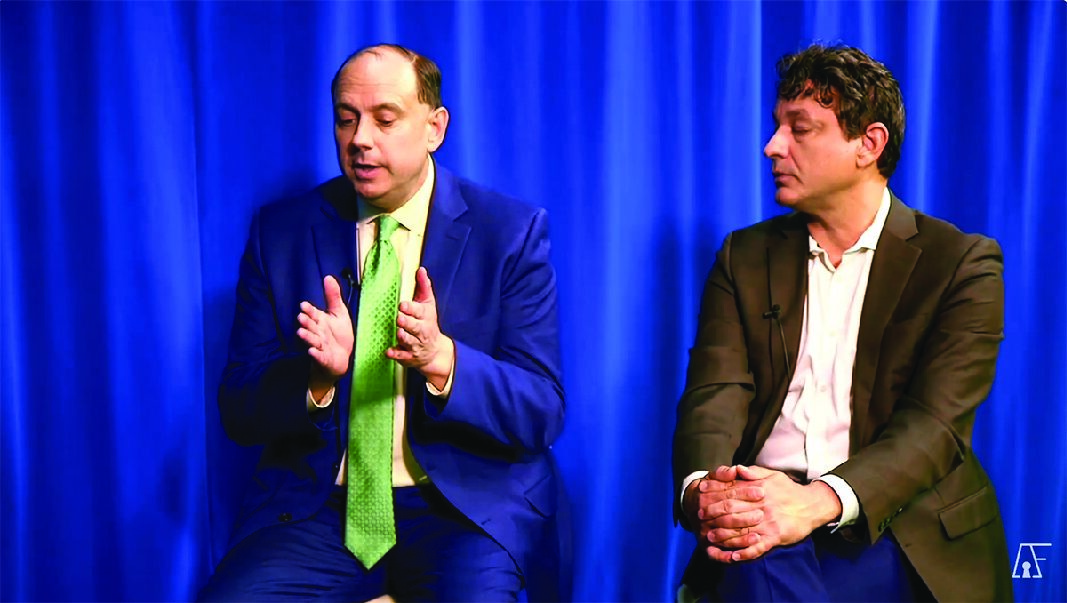As federal immigration raids spread across the state, anxiety is mounting among Massachusetts immigrant families, and so is the effort to protect them. Ashley Fuller of WayCAM TV’s “Meet Our Neighbors” sat down with immigration lawyer Antonio Massa and State Sen. Jamie Eldridge to understand how lawyers and lawmakers alike are intervening to aid immigrants in Massachusetts.
Massa said his firm, Massa Viana Law, has been taking on as many clients as possible to help Massachusetts immigrants who have been or are at risk of being detained. “It’s been very hectic,” he said. “We have struggled in our office to find the right balance. In February, we decided, ‘Let’s set a limit on how many cases we’re going to take, maybe we just stick to just taking three detainees at a time’ — and then that number went up to five.” Now they are taking as many cases as they can handle.
Eldridge is also busy, offering advice to his constituents in Middlesex and Worcester counties who have been affected by the Trump administration’s mass deportations. “Every two days, I get a message from someone that’s been arrested in my district, saying, ‘I need help, ’” he said.
While the two men approach the current immigration issue from different perspectives — Massa from private practice and Eldridge from the State House — they work hand in hand. Eldridge refers constituents in need to immigration lawyers, such as Massa, while he works on legislative reforms on Beacon Hill. “State legislators [are] getting contacted to connect people to, you know, people like Antonio, that are doing the immigration work for those who are detained,” he said.
As a legislator, Eldridge said he’s focused on making Massachusetts safer for immigrants through projects like the Safe Communities Act, a bill he sponsored that would bar Immigration and Customs Enforcement (ICE) from collaborating with local police to detain immigrants. He argues that local law enforcement agencies should operate independently of ICE to maintain public trust in law enforcement. “We want to prohibit any collaboration between local police, because that will break down trust, and it will, I think, further harm public safety,” he said.
If ICE and local police officers were allowed to collaborate, it would dissuade anyone without legal status from reporting crimes and make the Commonwealth more dangerous for everyone,” Eldridge said. “If an immigrant is a victim of a crime, they’re going to think twice about calling the police and reporting that crime, because they don’t want to, you know, get the police involved… To put that into perspective, that’s going to be children being abused. That’s going to be drug overdoses. That’s going to be husbands and wives that are being affected by domestic violence.”
Massa said another growing concern is ICE’s practice of transporting immigrants to far-off states to remove them from their lawyers and family, cutting them off from both family support and legal help. “If you get somebody that is detained in Massachusetts, and you now move that person to Texas, you’re removing them from counsel, you’re removing them from their immediate family,” he said. “Obviously, you’re going to make the process harder for that person.”
Eldridge said he often fields questions about why undocumented immigrants deserve due process. He responds with a question of his own: “We all, at one time or another, make some mistake in our lives. Do you want this situation to exacerbate so that nobody has due process? including American citizens?”
Massa added that there are several pathways to citizenship for immigrants who originally entered the country legally. However, “one of the big issues with immigration law is that people don’t understand, once you’ve overstayed your visa — once you come here and you have no status — it’s very difficult for you to go back into status. There are very, very, very slim channels for you to get back that status,” he said.
Massa himself exemplifies this long and challenging journey to citizenship — he was undocumented for 32 years. He moved to the United States when he was 12 years old and became an immigration attorney before he became a citizen. “I could have been picked up by ICE,” he said. “In fact, I became a lawyer when I had no status. That’s how crazy our system is. People don’t realize that.”
Massa and Eldridge continue their collaborative efforts to advocate for the legal rights of Massachusetts residents. But Eldridge said they need the supportive voices of the public to keep this fight alive. “We shouldn’t be afraid of being vocal about what is right,” he said. “If people are afraid, they can still pick up a phone, they can still email. Those are things that we all can do.”
From the transcript of Meet Our Neighbors on WayCAM TV, Episode: “Immigration, ICE & Due Process” with Sen. Jamie Eldridge & Antonio Massa. To see the full video, go to tinyurl.com/waycam-immigration.
















